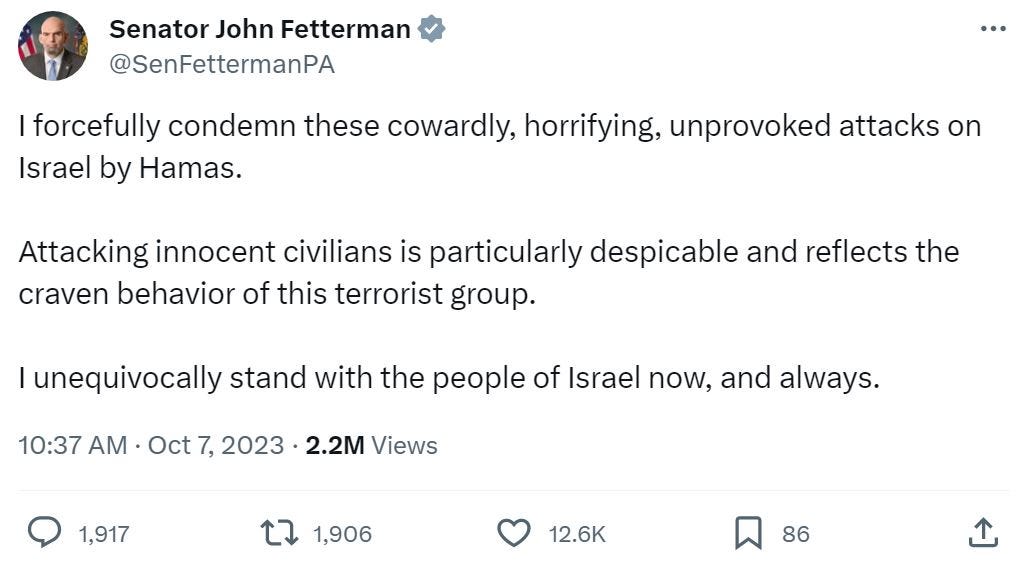Crisis and Clarity
Speaking and thinking clearly about Hamas’s terrorist attack on Israel and the war it began.
THERE ARE TIMES in politics and diplomacy when hedging and vagueness are appropriate, even wise. This is not one of those times. This is not a moment for factual ambiguity or moral equivocation. And so, a plea to politicians, journalists, and anyone else trying to explain what just happened, is happening, and will happen in Gaza and Israel: Precision and clarity are paramount.
Surprises such as Hamas’s attack on Israel on Saturday are, by definition, full of uncertainty. Mass violence of any kind is disorienting. Carl von Clausewitz could have been describing social media from this past weekend when he wrote: “Many intelligence reports in war are contradictory; even more are false, and most are uncertain. What one can reasonably ask of an officer”—he might have said ‘anyone’—“is that he should possess a standard of judgment.” The risk of misstatements, intentional or unintentional, is that, as George Orwell observed, “the English language . . . becomes ugly and inaccurate because our thoughts are foolish, but the slovenliness of our language makes it easier for us to have foolish thoughts.”
The easiest way to illustrate this point is with a few highlights and lowlights from the last few days.
To start, President Biden—not usually known for his felicity of expression—did an admirable job in his televised remarks from the White House Saturday: “Israel has the right to defend itself and its people. Full stop. There is never justification for terrorist acts.” Biden acknowledged the importance of his words. “Let me say this as clearly as I can: This is not a moment for any party hostile to Israel to exploit these attacks to seek advantage. The world is watching.” If Hezbollah or any other group decides to join in Hamas’s barbaric cruelty, it will not be because Biden failed to warn them off.
For contrast, Tom Cotton. “Nine Americans are dead, an unknown number are missing or held hostage, yet President Biden is nowhere to be seen and has nothing to say,” he tweeted on Monday, almost exactly two days after Biden’s televised remarks, one day after the news broke that Biden ordered the biggest warship ever built to park itself in the eastern Mediterranean, and just hours before the White House announced an extraordinary statement Biden released jointly with the leaders of France, Germany, Italy, and the United Kingdom. (The number of Americans killed in the attack has since been revised to eleven, and the final number may yet be higher.) The official statement posted to Cotton’s website on October 7 doesn’t mention Biden personally, but does say that the United States should “provide Israel the military and diplomatic support it needs to destroy Hamas.” That’s a much more specific, constructive contribution—and it happens to match almost verbatim what Biden the same day promised to do.
Whoever said that brevity is the soul of wit never met the junior senator from Kentucky. “My thoughts and prayers are with the people of Israel,” tweeted Rand Paul. “These horrific and violent acts of terrorism should be universally condemned.” (Nothing further.) Paul almost certainly meant to say that he condemns horrific and violent acts of terrorism, but technically he didn’t. Maybe if he had devoted more than twenty-one words to the matter, he would have eventually expressed a thought resembling the one that, we can only hope, exists in his head.
By contrast, the junior senator from Pennsylvania had no trouble stating his mind, in both a tweet on Saturday—
—and a press statement on Monday.
Paul could learn from Fetterman about the power of the active voice.
The foggiest, least helpful statement of all—at least so far—may be that of Rep. Rashida Tlaib:
In the very first sentence—“yesterday, today, and every day”—Tlaib minimizes the extraordinary horror of the attack. She fails to identify victims or aggressors. She blames a “system,” “conditions,” and a “violent reality” that “lead to resistance.” Without context, it’s impossible to tell from Tlaib’s words that Hamas terrorists slaughtered and kidnapped civilians en masse.
She also retreats to the swampy refuge of the confused: jargon. The issue here is not a “cycle of violence.” It’s terrorism. If there were no terrorism, there would be no violence. The violence isn’t cyclical; it’s political. (Along with “cycle of violence,” anyone seeking to speak clearly about the present crisis should eschew the terms “escalation,” “invasion,” and “occupation,” each of which has a specific meaning that does not apply to this situation.)
For absolute clarity—moral, semantic, and grammatical—it may be impossible to top Ben Wittes: “There are no problems to which the solution is the murder of civilians.”







